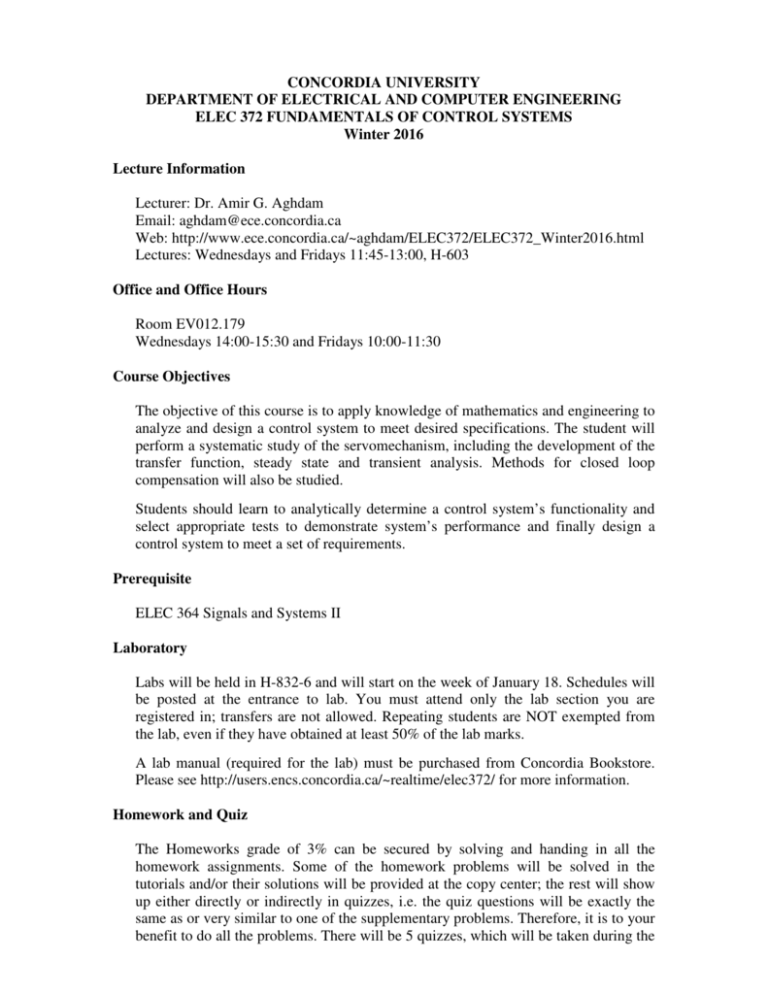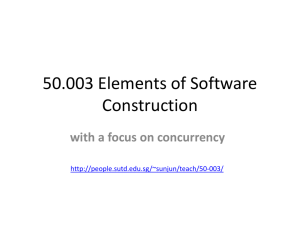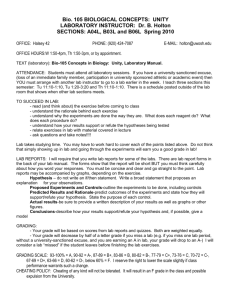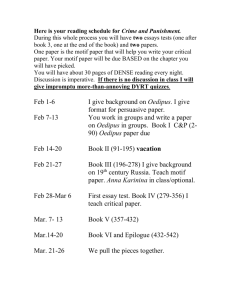Course Outline - Department of ECE
advertisement

CONCORDIA UNIVERSITY DEPARTMENT OF ELECTRICAL AND COMPUTER ENGINEERING ELEC 372 FUNDAMENTALS OF CONTROL SYSTEMS Winter 2016 Lecture Information Lecturer: Dr. Amir G. Aghdam Email: aghdam@ece.concordia.ca Web: http://www.ece.concordia.ca/~aghdam/ELEC372/ELEC372_Winter2016.html Lectures: Wednesdays and Fridays 11:45-13:00, H-603 Office and Office Hours Room EV012.179 Wednesdays 14:00-15:30 and Fridays 10:00-11:30 Course Objectives The objective of this course is to apply knowledge of mathematics and engineering to analyze and design a control system to meet desired specifications. The student will perform a systematic study of the servomechanism, including the development of the transfer function, steady state and transient analysis. Methods for closed loop compensation will also be studied. Students should learn to analytically determine a control system’s functionality and select appropriate tests to demonstrate system’s performance and finally design a control system to meet a set of requirements. Prerequisite ELEC 364 Signals and Systems II Laboratory Labs will be held in H-832-6 and will start on the week of January 18. Schedules will be posted at the entrance to lab. You must attend only the lab section you are registered in; transfers are not allowed. Repeating students are NOT exempted from the lab, even if they have obtained at least 50% of the lab marks. A lab manual (required for the lab) must be purchased from Concordia Bookstore. Please see http://users.encs.concordia.ca/~realtime/elec372/ for more information. Homework and Quiz The Homeworks grade of 3% can be secured by solving and handing in all the homework assignments. Some of the homework problems will be solved in the tutorials and/or their solutions will be provided at the copy center; the rest will show up either directly or indirectly in quizzes, i.e. the quiz questions will be exactly the same as or very similar to one of the supplementary problems. Therefore, it is to your benefit to do all the problems. There will be 5 quizzes, which will be taken during the first 15 minutes of the tutorials. For details see the course schedule. Each homework will be assigned on Friday and will be collected the following Monday in the tutorial. Late homeworks will not be accepted. Verification of analytical solutions by scientific software such as MATLAB for some homework problems is recommended. Using such software tools, if learned early in the semester, will be very helpful. Graduate Attributes for ELEC 372 The courses in the engineering programs include the development of a set of graduate attributes. One of the attributes relevant to this course is use of engineering tools, and will be evaluated throughout the semester. The definition of this attribute by the Canadian Engineering Accreditation Board (CEAB) is: “An ability to create, select, apply, adapt, and extend appropriate techniques, resources, and modern engineering tools to a range of engineering activities, from simple to complex, with an understanding of the associated limitations.” Exams There will be one midterm in addition to the final comprehensive examination. There will be no make-up exams. All exams will be closed book. However the students are permitted to bring in with them one 8.5*11 inch sheet of paper, written on both sides. Anything may be written on this paper. Students may photocopy things and tape/glue them to their crib sheet. However the taping/gluing must be on all 4 corners so that the attachment is not a "flap" that can be lifted up and more written underneath. The surface area available is only for the one 8.5*11 inch piece of paper. Only ENCS-approved calculators are allowed. Grading The final mark will be calculated as follows: HW: 3%, Quiz: 12%, Lab: 15%, Midterm: 20%, Final: 50% OR HW: 3%, Quiz: 12%, Lab: 15%, Final: 70% OR HW: 3%, Best of 4 Quizzes: 9.6%, Lab: 15%, Midterm: 2.4%, Final: 70% WHICHEVER IS BETTER. Textbook R1: Modern Control Systems by Richard C. Dorf and Robert H. Bishop, 12th Edition, Prentice Hall, 2011. Other References R2: Feedback Control of Dynamic Systems by Gene F. Franklin, J. David Powell and Abbas Emami-Naeini, 6th Edition, Prentice Hall, 2010. R3: Automatic Control Systems by Farid Golnaraghi and Benjamin C. Kuo, 9th Edition, John Wiley & Sons, Inc., 2010. R4: Modern Control Engineering by Katsuhiko Ogata, 4th Edition, Prentice Hall, 2002. R5: Feedback Control Systems by Charles L. Philips and Royce D. Harbor, Prentice Hall, R6: Control Systems Engineering by Norman S. Nise, 6th Edition, John Wiley & Sons, Inc., 2011. R7: Signals and Systems by Alan V. Oppenheim, Alan S. Willsky and S. Hamid Nawab, 2nd Edition, Prentice-Hall, 1997 Course Schedule i) Based on eighth, ninth, and tenth editions of the main textbook R1 DATE Lecture Notes #1 Week of Jan. 4 Lecture Notes #2 Week of Jan. 11 Lecture Notes #3 Week of Jan 18 Lecture Notes #4 Week of Jan 25 Lecture Notes #5 Week of Feb. 1 Lecture Notes #6 Week of Feb. 8 Week of Feb. 15 Week of Feb. 22 Lecture Notes #7 Week of Feb. 29 Lecture Notes #8 Week of Mar. 7 Lecture Notes #9 Week of Mar. 14 Lecture Notes #10 Week of Mar. 21 Lecture Notes #11 Week of Mar. 28 Lecture Notes #12 Week of Apr. 4 TOPIC Introduction to Control Systems and Mathematical Foundation R1: Ch. 1, R7: 1.6.3-1.6.6, R1: 2.4 Linearization and Block Diagrams R1: 2.6, R2: 3.2.1 (and lecture notes) Mathematical Modeling of Systems R1: 2.2, 2.5 Time Domain Analysis: 1st Order Systems R4: 5.2 Time Domain Analysis: 2nd Order Systems and Model Reduction R1: 5.3 (and lecture notes) Steady-State Error; Routh-Hurwitz Criterion R1: 5.7, 12.11, 5.8, 5.9, R1: 6.2, 6.3, R5: 6.1 (and lecture notes) Review on Wednesday February 17 Midterm on Friday February 19 (during the lecture time) Midterm Break Root Locus Technique R1: 7.1-7.3 Root Locus Technique R1: 7.5, 10.5 Root Locus Technique; Frequency Domain Representation R1: 10.7, 8.2-8.5 Frequency Domain Analysis: Nyquist Criterion R1: 9.2-9.4 Design of Control Systems: Lead Compensators R1: 10.3, 10.4, 10.6 Design of Control Systems: Lag Compensators R1: 10.8 Final Exam Assignments HW 1 (Due: Jan. 11) HW 2 (Due: Jan. 18) Quiz 1 on Jan. 18 HW 3 (Due: Jan. 25) HW 4 (Due: Feb. 1) Quiz 2 on Feb. 1 HW 5 (Due: Feb. 8) HW 6 (Due: Feb. 15) Quiz 3 on Feb. 15 No Homework HW 7 (Due: Mar. 7) No Homework Quiz 4 on Mar. 14 HW 8 (Due: Mar. 21) HW 9 (Due: Mar. 28) HW 10 (Due: Apr. 11) Quiz 5 on Apr. 11 HW 11 (Due: Apr. 11) ii) Based on eleventh and twelfth editions of the main textbook R1 DATE Lecture Notes #1 Week of Jan. 4 Lecture Notes #2 Week of Jan. 11 Lecture Notes #3 Week of Jan 18 Lecture Notes #4 Week of Jan 25 Lecture Notes #5 Week of Feb. 1 Lecture Notes #6 Week of Feb. 8 Week of Feb. 15 Week of Feb. 22 Lecture Notes #7 Week of Feb. 29 Lecture Notes #8 Week of Mar. 7 Lecture Notes #9 Week of Mar. 14 Lecture Notes #10 Week of Mar. 21 Lecture Notes #11 Week of Mar. 28 Lecture Notes #12 Week of Apr. 4 TOPIC Introduction to Control Systems and Mathematical Foundation R1: Ch. 1, R7: 1.6.3-1.6.6, R1: 2.4 Linearization and Block Diagrams R1: 2.6, R2: 3.2.1 (and lecture notes) Mathematical Modeling of Systems R1: 2.2, 2.5 Time Domain Analysis: 1st Order Systems R4: 5.2 Time Domain Analysis: 2nd Order Systems and Model Reduction R1: 5.3 (and lecture notes) Steady-State Error; Routh-Hurwitz Criterion R1: 5.6, 12.7, 5.7, R1: 6.2, 6.3, R5: 6.1 (and lecture notes) Review on Wednesday February 17 Midterm on Friday February 19 (during the lecture time) Midterm Break Root Locus Technique R1: 7.1-7.3 Root Locus Technique R1: 7.4, 10.5 Root Locus Technique; Frequency Domain Representation R1: 10.7, 8.2-8.4 Frequency Domain Analysis: Nyquist Criterion R1: 9.2-9.4 Design of Control Systems: Lead Compensators R1: 10.3, 10.4, 10.6 Design of Control Systems: Lag Compensators R1: 10.8 Final Exam Assignments HW 1 (Due: Jan. 11) HW 2 (Due: Jan. 18) Quiz 1 on Jan. 18 HW 3 (Due: Jan. 25) HW 4 (Due: Feb. 1) Quiz 2 on Feb. 1 HW 5 (Due: Feb. 8) HW 6 (Due: Feb. 15) Quiz 3 on Feb. 15 No Homework HW 7 (Due: Mar. 7) No Homework Quiz 4 on Mar. 14 HW 8 (Due: Mar. 21) HW 9 (Due: Mar. 28) HW 10 (Due: Apr. 11) Quiz 5 on Apr. 11 HW 11 (Due: Apr. 11)






